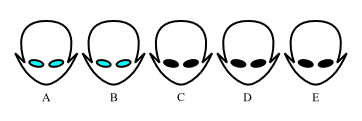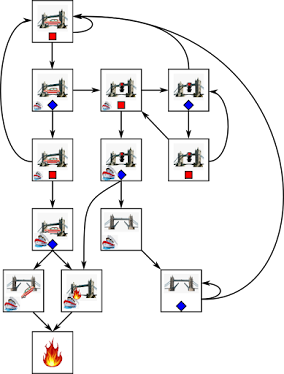On fiction: Rendezvous with NECA pt. 7
Author note: I've changed the text slightly from that seen at WaD because I spotted a rather embarrassing inconsistency. Oops. Oh well. That's what revisions are for.“What is it like to be a bat?”
She lifts her gaze from the microscope eyepiece. “Sorry?”
“It’s a philosophical conundrum,” Ballard says. “Bit of a trick question. If you can express it, then it’s not what a bat is like, because bats don’t have the capacity for language. Or so that philosopher thought.”
“Yes, well. What is it like to be a self-replicating space crystal,” she says, and resumes her examination of a tissue sample from the alien sea urchin shaped creature.
“I’m working towards establishing that too, Ms Evans.” He pauses, marker in hand, in front of an improvised whiteboard on the wall covered in scribbles. “Theory guides practice.”
Sea urchin cells frozen- or rather vitrified- stand before her eyes, illuminated in the microscope backlight. Practice can guide itself, thank you very much. She takes a few snapshots of the cells- not so different, at least in aspect, from those of an Earth animal. Something that looks like a nucleus, very likely the central storage of genetic material. Several dark spots and stripes, organelles most likely. Life elsewhere must have found similar solutions. But what strikes her is the continuous nature of the glassy material encasing the cells. It’s not a shattered mess of needles as it was for Hendrix’ cells. It’s almost as if it were not the same kind of crystal; and yet, cutting a slice off of the alien urchin and putting it into a culture medium for Earth bacteria produced the same glass hedgehog growth she saw in the communications room when she found Hendrix’ body. A row of covered Petri dishes, all with tiny, spiky growths of crystal, lie spread out wide on a bench to her side.
“Size matters,” he says. “We humans are a certain size, we see the world a certain way. We have notions of space and time as separate, we think of position and momentum as distinguishable, we have a certain idea of how inertia affects things. The intuitive categories of our mind are those of classical Newtonian physics. But if we were very small … what would Feynman do?”
She takes a quick glance at the whiteboard. Her disinterest isn’t feigned; its contents mean nothing to her. What she is interested in is Ballard’s watch. It’s been twenty nine minutes since he last took a leave of absence. Hand on his chin, he paces, back and forth, in front of the whiteboard, seemingly lost in thought. But she knows better. Indeed, right before thirty minutes elapse on her own timer, Ballard’s pacing takes him out of the laboratory.
“What do you think of Ballard?” she asks as she turns to Dezaki.
“I think he’s a very intelligent man,” Dezaki replies, still watching her computer monitor and annotating stills from microscope cameras.
“There’s something strange about him.”
“Smart people are often like that.”
“I need to show y-”
Ballard rushes back into the room. “I think I have an idea. Ms. Evans, do we still have those older crystal cultures you took from the comm room?”
She rises. “The ones I used to test if it spreads through air? Yes … ” She paces to a container and takes out a glass dish, a small crystalline drop in the middle of its orange bacterial culture material. Either the spikes have gotten plentiful and caked together, or her eyes are too tired to see the spaces, or the crystal has indeed grown smoother over time. “Hm.”
“Indeed,” he says, “looks … well developed. Might we put that near one of the newer samples? Just bring the containers close to each other, do not mix them.”
She complies. Ballard and she stare at the pair of crystal cultures- one an erratic mess of spikes, the other a smooth blob, each in their own little glass prison. If it weren’t for the hum of the air circulation system, it might appear time has stopped. Dezaki’s clothes rustle behind her as the ship’s doctor joins their vigil.
The spikes retract.
Her vision tunnels and nothing exists but the crystals. The spikes retract. Slow but visible in their motion back towards the core of the growth, its surface smoothing into an almost perfect sphere.
“That isn’t chemistry. That is communication!”
She’s too fascinated by the smoothing blob to see, but she can feel the floor vibrating under his jump and his arms briefly close around her as he gives her a quick kiss.
“Communication! Let’s do that again,” he says, and giddily brings another little crystalline hedgehog near the smooth blobs. Seconds later, it also smooths. He gives Dezaki a celebratory hug too, but the doctor looks grimly at the three dishes.
“They are teaching each other how to handle Earth proteins.”
Ballard raises an eyebrow. “Let’s hope then I’m only half-right and they don’t think of us as prey.”
“Can they see us?”
“Much like we see the Earth is flat, they probably don’t have a good direct picture. And much like we know the Earth isn’t, they might understand more than they see.”
“I think we should tell the Captain,” Dezaki says.
-:-:-
She plays with the sleeping pill between her fingers. Should she, or not? One’s body is a holy temple after all, and so far she had been careful to avoid defiling hers with anything that would alter its functions. If some pill can change what happens in one’s brain, it’s poison. Sleeping pills for restlessness, happy pills for sadness, more pills for every inconvenience, that way addiction lies. But then, what of the months she spent in hibernation as the ship traveled to NECA? That was different, there was no other way to get here ...
How different was it, though? She must rest now, that much is true. And also true, rest doesn't find her. The pill tumbles in her hand. Just once, maybe? Come on, it's not convenience, it's duty.
After all, she was the one to tell the doctor of her lack of sleep, and she was the one who chose to keep watch over what used to be the ship’s main comm room. New protocol after the crystalline contamination; everyone gets a segment of the ship to watch over and call their own. Anyone could have chosen the comm room, but she volunteered first.
The place looks nothing like it used to. Once filled with machinery, its bareness is disturbed only by a mat, her sleeping bag, and a few personal odds and ends. From behind closed eyelids she remembers, there used to be a corpse here too. The pill sits in her palm. Just once, maybe?
Laboratory work done in partially overlapping shifts, it is her turn to catch a couple hours’ sleep. Better take advantage of them. Somewhere else, Captain Chahal, Gubarev, and Yang, work out a plan to amp up Sfetnik’s transmitter so it could act as a link to Earth. One of them might be resting too.
She takes the pill to her mouth, then decides against it. No. It's just convenience. Instead, she grabs the jar with the two wisps inside. There was no chance to show it to Dezaki. Not in a way that she’d understand why they were important. Not in a way that Ballard wouldn’t spot.
They are beautiful, the wisps, with their pale yellow, subtle flicker. They remind her of an ancient filament light-bulb she once saw glow in an antiques store. So different, warm, not like the blue white ice of the ship’s regular lights. There’s more than beauty to wisps’ flicker though. A double blip on one of the wisps. Moments later, a double tap on the other as she gives the jar a gentle shake. What would happen if, when she saw one of the wisps blip, she’d then resolve to keep the jar still and the other wisp untouched? She waits. No disturbance in the wisps’ light. No cheating them, it seems. No cheating fate. The future they predict must happen. And yet …
She imagines Ballard, going along the wisp corridor that second time they went inside NECA, and sending a message to his past self: nothing interesting here. His past self then doesn’t go to the wisp corridor, but chooses another. Maybe nothing interesting there either, so he sends another message back in time, avoid both these places. And so on. Until he finds the chamber of the crystallized aliens. He tells his past self to go there, and he does, unerringly. As if he knew the place. As if, as she herself remarked then, he had been there before. In some sense, he had been.
And there is no paradox at all. Time plays back, again and again, until it stabilizes into a consistent history. What ends up happening is what Ballard sees as best. Fate bends to will. So what does he want?
He was very helpful in the laboratory. Maybe another inspiration brought by the trials of possible Ballards collapsed into one reality most preferred. But how did he get his wisps to receive messages from thirty minutes into the future? Couldn’t he then send messages, like a relay, from an hour into the future, or more? And why doesn’t he tell anyone?
-”Captain Chahal here. Doctor Ballard, please come to the mess hall for a couple of minutes, we need a review on the Sfetnik plan.”-
She turns away from the intercom voice, wisp jar in hand. So many questions, they jumble in her head. Thoughts start in one place and don’t finish at all. Warm light in an antique shop- they’d make good candles for home. Her eyes close.
She is old. A mediterranean breeze caresses her tanned wrinkled skin as the summer sun shines over the island; the shade from a pair of cypress trees protects her from its heat. Small waves rustle against a rocky beach, their rhythmic soothing sound broken only by the laughter of children. Not hers, but they might as well be. They play, and she watches. And when they stop playing, they gather around her to listen to another of her stories, of places far away, or far below, or far above, stories of what she found there, before returning to their game of pretend, avid explorers of the shore and soon of the ocean stretching all around them.
A boiling teapot whistles in the distance and she is now in the kitchen, tending to it. Fresh from the oven, a pumpkin pie makes the air itself seem edible, but the little adventurers still need some prodding. “Lunchtime!” she calls.
They hear and rush towards her, doubling their pace as they too feel the aroma of the pie. All, save one little boy. He stands forlorn on the beach, a wooden stick in hand to prod something hidden behind a stone.
“Come here, David,” she says.
He turns and shuffles towards her, head lowered.
“Is something wrong?” she asks.
“Dezaki is dead.”
-”I repeat, Dezaki is dead. Crystalline infection.”- Ballard’s voice.
A sharp alarm blares for a second.
-”This is Captain Chahal. Restarting anticontamination protocol. Everyone give me your status. Chahal, navigation, ok.”-
-”Yen, navigation, ok.”-
A sleepy grumble. -”Gubarev. Logistics. Ok.”-
She punches her intercom. “Evans. Comm room. Ok.”
-”Ballard. Med lab. I’m fine.”-
You bastard.
-”Everyone get to your hazmat suits. Ship’s air circulation will be cut off in two minutes.”-
Ballard, you bastard. Is this the reality you preferred?


Comments
Post a Comment